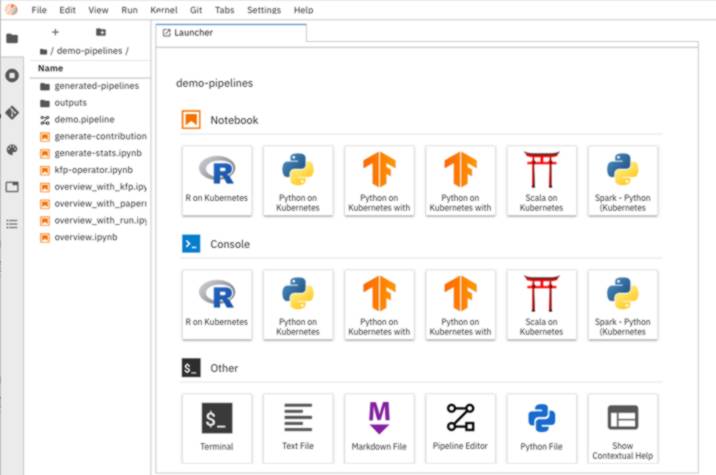| IBM's Elyra AI Toolkit |
| Written by Sue Gee | |||
| Thursday, 30 April 2020 | |||
|
IBM has announced the Elyra AI Toolkit, a new open source project that extends the JupyterLab user interface to simplify the development of data science and AI models. Introducing Elyra in a blog post, Luciano Resende, IBM's Open Source AI Platform Architect and the majot contributor to the Elyra project on GitHub explains: Jupyter Notebooks are currently the open standard for data science and AI model development. However, sometimes they lack the integration capabilities expected for enterprise-grade products and technology. Elyra is a set of AI-centric extensions to Jupyter Notebooks to plug this ga which aims to help data scientists, machine learning engineers and AI developer's through the model development life cycle complexities. This video introduces Elyra's main features and how to use them, revealing that its name is pronounced El-i-ra:
Elyra provides a visual editor for building Notebook-based AI pipelines, simplifying the conversion of multiple notebooks into batch jobs or workflows. Currently, the only supported pipeline runtime is Kubeflow Pipelines, but others can be easily added. Elyra has hybrid runtime support thanks to the the work that has been done with Jupyter Enterprise Gateway to enable Jupyter Notebooks to share resources across distributed clusters such as Apache Spark, Kubernetes, and OpenShift. It simplifies the task of running the notebooks interactively on cloud machines, so you can use the power of cloud-based resources that enable the use of specialized hardware such as GPUs and TPUs.
Elyra has Python script execution capabilities within the editor and exposes Python Scripts as first-class citizens, allowing users to locally edit their scripts and execute them against local or cloud-based resources seamlessly. Notebook versioning is based on git integration making tracking changes easier. It allows users to roll back to working versions of the code, backups, and facilitates sharing among team members. To further support collaborative working and promote productivity, Elyra introduces a ‘shared configuration service’ that simplifies workspace configuration management, enabling things like information around accessing external runtimes to be configured once and shared across multiple components. Commenting on the launch of Elyra,Fernando Pérez, Project Jupyter's co-Founder and co-Director said: “I’m excited to see IBM engaging with the Jupyter and scientific open source communities with their ongoing contributions in this area. As much as AI tools rely on vast amounts of data and computational resources, the human in the loop remains the critical element for both asking the right questions and making decisions responsibly. That’s where Jupyter plays a role, and I’m delighted to see new tools like Elyra that will help AI workflows within the Jupyter ecosystem." Elyra can be installed via PyPi and its prerequisites are Python 3.x and NodeJS 12+. You also need Docker if using the docker image and optionally Anaconda. JupyterLab 1.x is supported on Elyra 0.10.0 and below and JupyterLab 2.x on Elyra 0.11.0-rc0 and above.
More InformationRelated ArticlesTensorFlow 2 Offers Faster Model Training Python In Visual Studio Code Improves Jupyter Support .NET Jupyter Notebooks Announced To be informed about new articles on I Programmer, sign up for our weekly newsletter, subscribe to the RSS feed and follow us on Twitter, Facebook or Linkedin.
Comments
or email your comment to: comments@i-programmer.info
|
|||
| Last Updated ( Thursday, 30 April 2020 ) |



